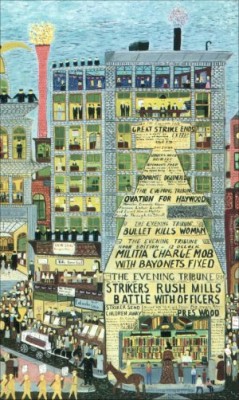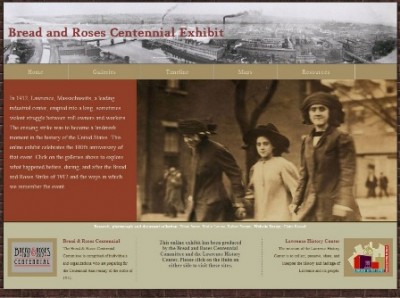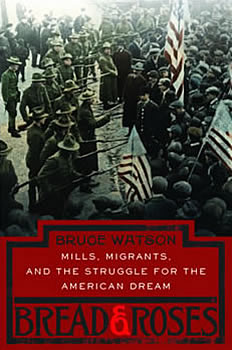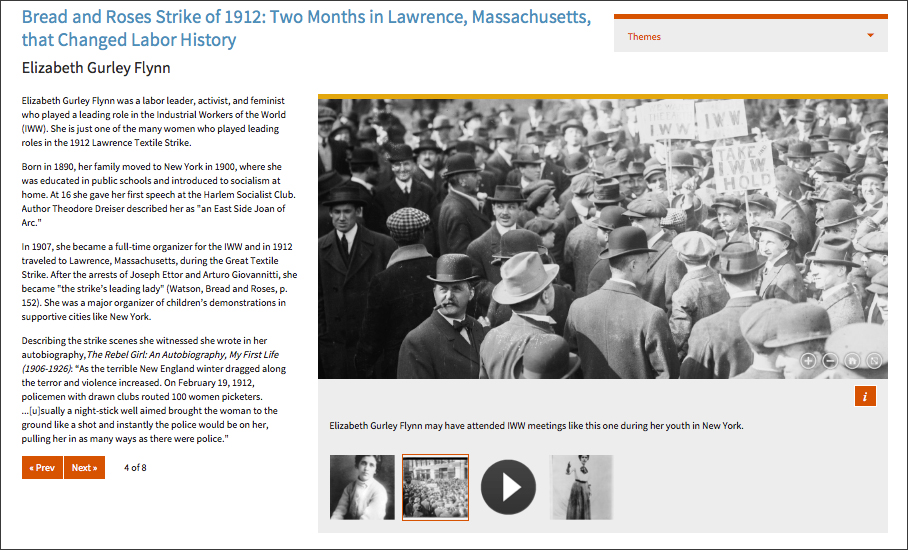
The Great Strike — Lawrence 1912 by Ralph Fasanella. Courtesy of Fasanella Estate. Click to enlarge.
The slogan “Bread and Roses” originated in a poem of that name by James Oppenheim, published in American Magazine in December 1911, which attributed it to “the women in the West.”
It is commonly associated with the textile strike in Lawrence, Massachusetts during January to March 1912, now often known as the “Bread and Roses strike.” The strike, which united dozens of immigrant communities under the leadership of the Industrial Workers of the World, was led to a large extent by women.
The strikers are credited with inventing the moving picket line, so that they would not be arrested for loitering.
It was settled on terms generally favorable to the workers. They won pay increases, time-and-a-quarter pay for overtime, and a promise of no discrimination against strikers.
It has long been thought that Oppenheim was inspired by a strike sign carried by women with the slogan, “We want bread, but we want roses, too!”
We now know that he did not write it during the strike. But it was embraced by the strikers and the notion of “Bread and Roses” has become a cry for justice and dignity for women workers around the world.
Observer Ray Stannard Baker wrote in The American Magazine:
[Lawrence] is the first strike I ever saw which sang. I shall not soon forget the curious lift, the strange sudden fire of the mingled nationalities at the strike meetings when they broke into the universal language of song. And not only at the meetings did they sing, but in the soup houses and in the streets.
Bread and Roses has since become a women’s movement standard with either of two melodies variously attributed to Martha L. Coleman, Caroline Kohsleet, and Carolin Kohlsaat. Utah Phillips also has a melody, as does Mimi Fariña, whose is the most well-known. [From Labor Notes.]
Bread And Roses
- As we go marching, marching, in the beauty of the day,
- A million darkened kitchens, a thousand mill lofts gray,
- Are touched with all the radiance that a sudden sun discloses,
- For the people hear us singing: Bread and Roses! Bread and Roses!
- As we go marching, marching, we battle too for men,
- For they are women’s children, and we mother them again.
- Our lives shall not be sweated from birth until life closes;
- Hearts starve as well as bodies; give us bread, but give us roses.
- As we go marching, marching, unnumbered women dead
- Go crying through our singing their ancient call for bread.
- Small art and love and beauty their drudging spirits knew.
- Yes, it is bread we fight for, but we fight for roses too.
- As we go marching, marching, we bring the greater days,
- The rising of the women means the rising of the race.
- No more the drudge and idler, ten that toil where one reposes,
- But a sharing of life’s glories: Bread and roses, bread and roses.
- Our lives shall not be sweated from birth until life closes;
- Hearts starve as well as bodies; bread and roses, bread and roses.











Twitter
Google plus
LinkedIn